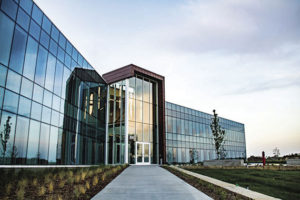
The Iowa State University Research Park in Ames, Iowa, is home to more than 70 businesses, from startups to internationally known chemical companies. (Photo by Iowa State University)
Via Iowa Farmer Today
November 10, 2017
By Corey Munson
Agricultural innovations happen every day in Iowa. Some involve learning new and better ways to care for fields or flocks, others are next-generation technological advancements developed in university labs.
Programs and facilities at Iowa State University are enabling students and businesses to collaborate, create and implement ideas for agriculture. A big part of this is the ISU Research Park, headed by Steve Carter.
The facility describes itself on its website as “an innovation community and incubator for new and expanding businesses.”
Carter said a facility like this at a university has a couple advantages, giving companies (especially startups) access to advanced research equipment and an eager workforce.
From Iowa State’s perspective, its students gain access to career experience and even have an opportunity to innovate and apply their own ideas.
“Young people who are earning their education, learning the latest techniques, the newest approaches – there aren’t many places where a company can find 4,000 to 5,000 (highly skilled) young people looking for work every year,” Carter said.
He said the 30-year-old ISU Research Park covers 400 developed acres with room for expansion and includes 75 companies with a total staff of nearly 1,800 people.
“For this research park, startup companies have been core to our growth strategy,” Carter said. “It is what has driven almost all of our growth. We have been fortunate to have a number of successful technology companies that have then attracted large companies that have acquired them and then continued those operations here.”
That list includes companies such as BASF, which bought a startup called Exceed Genetics that focused on starch in corn; Boehringer Ingelheim, which acquired Nobel Labs after it developed animal vaccines; and Merck, which purchased Harris Vaccine, a company that developed human vaccines for use with animals.
The types of businesses Carter is seeing growth in right now include animal health, precision agriculture, and plant genetics and development.
“Just in those areas, that includes everything from equipment manufacturing to artificial intelligence to GPS systems to genetics,” Carter said. “It’s a very wide range of research, development and opportunity.”
Entrepreneurs in the classroom
Innovation and startup opportunities are not limited to the research park. Economics professor Kevin Kimle oversees the Agricultural Entrepreneurship Initiative (AgEI), which provides students with practical business development experience.
In addition to the AgEI program, Kimle also created the Ag Startup Engine, based at the ISU Research Park. The ASE was launched two years ago to help address two gaps that prevent agricultural startups and entrepreneurs from being more successful in Iowa: early investment and organized mentorship from successful Iowan and Midwestern entrepreneurs.
“We have five business that are already a part of ASE that are doing very interesting things,” Kimle said.
Over the next three years, ASE will identify and fund a total of 15 high growth potential ag startups.
One startup funded through ASE and housed at the research park is Terva, which bills itself as the “Zillow of agricultural farm real estate.”
The ag-focused real estate website says its mission is to “make the world’s farmland information more accessible” by connecting landowners with farmers and real estate professionals.
“Growing up on a fifth-generation family farm, I was raised to solve problems,” Steven Brockshus, CEO of Terva, said in an news release. “That’s exactly what we do at Terva. We’re using technology to tackle the issue of land access.”
Innovation ecosystem
Ultimately, one thing Carter and Kimle are both working toward is developing the Ames-Des Moines region into a technological hub.
“When people talk about Silicon Valley, they talk about it as a place, an ecosystem. To a degree, that’s where we’re headed,” Carter said. “You don’t build an environment in a day, a week, a month or a year. It takes time and there’s a broad set of resources that need to be available. We’re well on our way.”
Kimle said the disadvantage for agriculture is that the industry is so spread out.
“We don’t have a bunch of the industry concentrated in one place like technology is in the San Francisco Bay area or bio-tech is in Boston,” he said. “We see Ames and central Iowa as an emerging center and an increasingly vibrant agriculture ecosystem.”
After all, Kimle points out, “This is where agriculture happens.”

Recent Comments